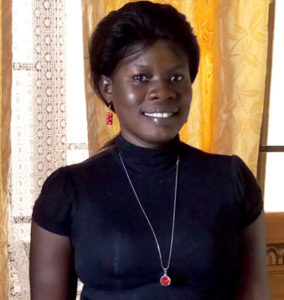The situation of South Sudan’s women and girls remains one of those enduring blights on the country’s conscience. The country retains the unenviable reputation of having the world’s highest maternal mortality rate, and at 51.5%, one of the highest cases of child marriages. It is even worse with gender-based violence(GBV): A 2019 study by UNICEF found that one in every two South Sudan women have experienced intimate partner violence, while a recent UN study, alarmed at the widespread nature of conflict-related sexual violence in the country, in which women are tread as “spoils of war” described it as “a hellish existence for women and girls.
It is this situation that makes the work of people like Julia Onyoti priceless. One of South Sudan’s leading women human rights defenders (WHRDs), she works to reverse generations of marginalisation of women and girls, while pursuing justice for survivors of abuse. In 2017, she founded the Transitional Justice Working Group (TJWG) to pursue justice for victims and survivors of conflict-related sexual and gender-based violence in South Sudan, following the 2013 and 2015 cycles of political violence that had beset social and political order in the country, leaving many women and girls as victims of sexual violence.
“I documented chilling cases of sexual and gender-based base violence. I witnessed different forms of human rights violations including gang rape. I interviewed victims, witnesses, and families of survivors, and what I found left me very uncomfortable. I had to do something about it,” she saya
Julia Onyoti Tweet
Today, she goes around the country documenting reports and testimonies of violations and abuses, with a view of pursuing justice for victims in the country’s transitional justice mechanisms. She also works with community groups to sensitize them about the importance of freeing women to have an equal say and stake in critical decision-making processes, as an effort towards achieving gender equality and ending years of women marginalisation. She says that although South Sudan recently ratified the Maputo Protocol on women’s rights, a lot remains to be done to achieve the instrument’s aspirations:
“Our (South Sudan) social norms need to evolve to appreciate women as equal and valuable contributors in the public arena. When this happens, women will be respected, and no longer seen as primarily objects for sex and domestication. It is this (the latter) warped view of women that enables men to feel entitled to women’s bodies, enabling a culture of sexual abuse including rape and GBV,” she says.
Julia Onyoti Tweet
For now, Julia must ride against entrenched social misconceptions that perceive her work and that of colleague WHRDs as a representation of western cultural imperialism that seeks to reverse South Sudan’s patriarchal cultural norms that have historically enabled social impunity for men while subjugating women. Born 34 years ago in South Sudan’s Upper Nile state, she attributes her confidence to her father, who raised her as an equal peer with her seven brothers, and empowered her to believe that her gender made her no less valuable or intelligent than the male members of her household:
“Whenever we had a family decision to make, my dad would call all of us – we were 10 in number (3 boys and 7 girls) on one table and every one of us would be allowed an opportunity to have their say. With hindsight, that was revolutionary because at the time, it was a taboo to allow women to participate in decision making. Girls were only seen as a source of wealth – to be married off for bride price. So, from early on, my father was my role model regarding gender equality and women empowerment,” she says.
Julia Onyoti Tweet
Today, she is also a role model to many girls and women in South Sudan. In 2020, she was awarded as the Human Rights Defender of the year by the South Sudan Human Rights Defenders Network. The cause that has gotten her to this point – her passion for women’s rights is one she’s determined not to give up.

